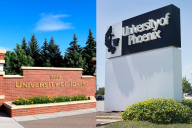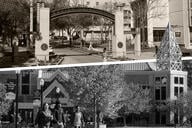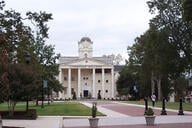You have /5 articles left.
Sign up for a free account or log in.
The deal seemed a good one for the Watkins College of Art, a small, private art and design college in Nashville, Tenn. It would be absorbed by Belmont University, also in Nashville, and its faculty could apply for jobs at Belmont. Watkins has fewer than 200 students and has been struggling financially.
But since the deal was announced Tuesday, concerns have been raised about how non-Christian faculty members at Watkins will fare. Belmont is a Christian college and hires only Christian faculty members. At a forum for Watkins students on Wednesday, Artnet News reported that the provost at Belmont, Thomas Burns, said, “We do not hire people who are not Christian … So the ones who are not Christian will not be eligible to work at Belmont. That’s just part of who we are.”
A spokeswoman for Belmont released the following statement: "Belmont and Watkins will be evaluating faculty and staff needs based on the assimilation of Watkins into Belmont. This process will likely take several months, and despite what is being reported, no decisions have been made. Existing Watkins faculty and staff will certainly be given first opportunity to fill any new positions of need. Because we recognize current Watkins employees could not control nor anticipate merging with a faith-based institution, it has been determined that special consideration will be given to current Watkins employees regardless of their position of faith. This exception to Belmont’s hiring policy is only being made due to the nature of merging institutions and out of Belmont’s commitment to care for the Watkins community."
Watkins students have already been talking and rallying against the merger. Opposition to mergers is common -- especially at the college being absorbed -- but the Watkins-Belmont merger has been complicated by the issue of religion.
Quinn Dukes, an artist in New York City who graduated from Watkins in 2007, said she was "really shocked" to learn of the merger plan. Since graduating, Dukes has visited about once a year to meet students. "It's that kind of place," she said.
The idea that Watkins would merge with an institution that would not hire non-Christians is "really disappointing," she said. Dukes said she would have been more open to merging with an institution that hires all kinds of faculty members, and she said that the issue of faculty hiring raised questions in her mind about the treatment of gay artists at the college.
She organized an open letter to the Watkins board questioning the merger. More than 2,800 people have signed the letter.
"The spirit of Watkins is vastly different from that of Belmont University," the letter says. "Students like myself choose Watkins because of its promotion of the individual by immensely thoughtful and skilled faculty. Watkins was a safe and inclusive space for creatives from all backgrounds, preferences, and identities."
The letter raised questions about how current Watkins students would take Belmont's required religion courses, and asked for details about how Belmont planned to treat the faculty members it did not hire.
Steve Sirls, the chair of Watkins' board, posted a response.
"I want to assure you that the board pursued this direction only after careful consideration of the realities facing Watkins now and in the future."
He noted that Belmont has pledged to welcome students and to provide an inclusive environment for "students regardless of age, race, gender or sexual orientation." He did not mention the faiths of faculty members.




